Alex Gilvarry: From the Memoirs of a Non-Enemy Combatant
March 27, 2012 by David
Filed under Fiction, WritersCast
 978-0670023196 – Viking – Hardcover – $26.95 (ebook and audio book versions available)
978-0670023196 – Viking – Hardcover – $26.95 (ebook and audio book versions available)
Brilliantly composed as a satire on a broad swatch of contemporary American life, Alex Gilvarry’s From the Memoirs of a Non-Enemy Combatant will sneak up on you and whack you straight across the face. Even if you see it coming. I loved the writing, which is smart and slick, beautifully evocative, from a writer clearly in love with language and its many powers. For a first novelist, Gilvarry displays considerable writing chops, on top of his comedic skills and ability to skewer so many elements of the popular culture we have so taken for granted.
This book is structured as the unreliable narration of its main character, Boyet (Boy) Hernandez, who is a Filipino fashion designer come to New York to make his way in the world. The first two thirds of the book is his almost hapless story of the road to success (many wild and crazy people and events along the way), where we come to know and care about, but not necessarily love Boy, who is sometimes so self-involved and full of shit, even as he is talented and appealingly immature (I want to say “jejune” but he’s not quite that bad).
But things turn dark, when Boy is arrested and sent to Guantanamo and both privately and publicly humiliated as a suspected terrorist. This is where the author can turn his powerful satiric eye onto the political and cultural state of America at perhaps its worst. There is nothing more frightening than to see a true innocent (naif is the right word here) caught in the web of the modern anti-terror police state. While Boy is eventually freed, and as readers we are relieved, his life can never be the same – his glorious desire-fueled run into the heart of American pop culture has been destroyed, and he must become a new and immensely different person, and this is not necessarily for the better, in his case.
Ultimately, for this author, it feels as if there are two Americas, co-existing, but on different planes of existence. Both are heightened realities, in which most of us seem to live without really understanding what they mean. In many ways, this novel, with its humor, pathos, narrative power, and its ability to pinpoint cultural weaknesses and failures, can do more to help us understand the necessities of political and culture action than any of even the best nonfiction treatises that address the manifold issues of the early 21st century.
But don’t worry about the politics, just read this book for the wonderful novel it is, and draw your own conclusions about what you want to do after you read it. You might just want to listen to this interview then to hear more from Mr. Gilvarry about his book and how work as a writer (and editor – Alex is now the editor of the book review collaborative Tottenville Review, which I recommend you visit).  I had a wonderful time talking to this author and hope you will also enjoy the conversation.
I had a wonderful time talking to this author and hope you will also enjoy the conversation.
Also, visit Alex Gilvarry’s website for more information and news about this book and his work.
Podcast: Play in new window | Download
Georgia Lowe: The Bonus (a novel)
January 26, 2012 by David
Filed under Fiction, WritersCast
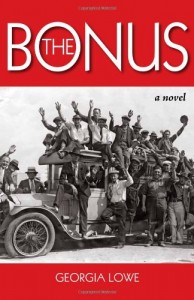 978-0615371450 – Lucky Dime Press – $18.95 – paperback (ebook editions available)
978-0615371450 – Lucky Dime Press – $18.95 – paperback (ebook editions available)
I confess to be particularly fond of Depression era novels and nonfiction. The 1920s and 1930s were incredible periods in American history, so much like the present time it is sometimes strange and even eery. I’m not sure how many readers coming to this novel will know its historical background. In 1932, at the height of the Great Depression, while Hoover was still President, thousands of World War I veterans mobilized to lobby Congress to pass a bill to give them their war service bonuses immediately, to save them from utter poverty and starvation. 2o,000 of them ended up camped in and around Washington, D.C. at the end of their Bonus March.
The political elements of this story sound pretty familiar to anyone who is paying attention to modern political speech. It’s impossible to not think about the Occupy movement as you read this novel, which of course was conceived and written long before that movement’s inception.
Georgia Lowe’s parents were bonus marchers. She grew up hearing their stories about the hot summer of 1932 in Washington, D.C., when General MacArthur, himself also a World War I veteran, brutally dispersed the homeless and destitute marchers, including the families of the vets. Those stories inspired her, but she did not even begin to write fiction until she was much older. She started the novel more than 10 years ago, using elements of her own family’s stories to create the framework of her novel.
I found The Bonus to be a remarkably well written novel that flows beautifully and naturally. I’d characterize it as a “naturalistic” novel, and it feels to me as if it could have been written in the 1930s, with a truly authentic sense of the period, the places and the people of that time. The story focuses on Bonnie and Will, she a struggling actress and he a journalist (and veteran in denial of the pain of his wartime experience), both of them living reasonably well in Hollywood. They each become connected to the Bonus March in different ways, and end up together in Washington, where their personal lives become entwined with the real events surrounding the marchers and their treatment in the capitol. You’re not reading a novel to learn the history, but you will learn it and I think you will feel, as I did, that history is remarkably circular.
I think history has birthed a wonderful novelist. The Lucky Dime website tells us that Georgia is hard at work on two new novels, a prequel to The Bonus entitled An Ordinary Kid and a sequel, The Old Ladies. These are books I will want to read. I can’t resist making a plug for another novel, one that was actually written in the 1930s by a now almost forgotten writer, Thomas Boyd, In Time of Peace, a book I think should be read together with The Bonus to create a really powerful understanding of our own period through the lens of another.
Talking with Georgia was alot of fun for me since I liked her book so much. I hope you will enjoy it as well. And I am not alone in liking this book alot – The Bonus won first place in the highly competitive Mainstream/Literary Fiction category of the Writer’s Digest Self Published Book Awards.
Podcast: Play in new window | Download
Lisa Tucker: The Winters in Bloom
November 19, 2011 by David
Filed under Fiction, WritersCast
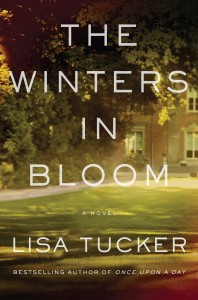 978-1416575405 – Atria – Hardcover – $24.00 (ebook editions available)
978-1416575405 – Atria – Hardcover – $24.00 (ebook editions available)
From the author’s website describing The Winters in Bloom:
Together for over a decade, Kyra and David Winter are happier than they ever thought they could be. They have a comfortable home, stable careers, and a young son, Michael, whom they adore. Yet because of their complicated histories, Kyra and David have always feared that this domestic bliss couldn’t last – that the life they created was destined to be disrupted. And on one perfectly ordinary summer day, it is: Michael disappears from his own backyard. The only question is whose past has finally caught up with them. David feels sure that Michael was taken by his troubled ex-wife, while Kyra believes the kidnapper must be someone from her estranged family, someone she betrayed years ago.
As the Winters embark on a journey of time and memory to find Michael, they will be forced to admit these suspicions, revealing secrets about themselves they’ve always kept hidden. But they will also have a chance to discover that it’s not too late to have the family they’ve dreamed of; that even if the world is full of risks, as long as they have hope, the future can bloom.
The Winters in Bloom is the first book I have read by Lisa Tucker, whose books are about families and relationships. I wasn’t sure when I started it whether I was going to finish, I was worried that it was going to be formulaic and predictable, and especially at the outset of the novel, where the two parent characters are introduced, I was very nervous about where this book might go and whether I could stay with it.
It turned out that I could not put it down. It is full of surprises, deeply felt, complicated in ways that are better left for the reader to discover for her or himself. I ended up of course, loving the book, and looking forward to talking with Lisa about her characters and her writing. And did I say, she is a terrific writer?
As with the title itself, which has a subtle ambiguity, this novel will offer readers depth and a kind of thoughtfulness about what a family can and should be, that runs counter to our initial expectations for it. I really liked being surprised by this book. Lisa also gives a great interview and I think you will enjoy hearing our conversation about her book.
I really liked this quote about the book too:
“Brilliant, tender, and riveting. . . Reading The Winters in Bloom is like falling into some beguiling dream, one you don’t want to wake from. There is a fascinating strangeness at work here, an off-kilter logic that keeps you enrapt and breathless. This is what can happen to people like us when the past comes calling. Lisa Tucker has not described a world; she has created one unlike any you’ve never seen. She has breathed life into her characters, and they will breathe life into you.”
— John Dufresne, author of Requiem, Mass
Lisa Tucker’s website is worth a visit also.
Podcast: Play in new window | Download
Amor Towles: Rules of Civility
November 4, 2011 by David
Filed under Fiction, WritersCast
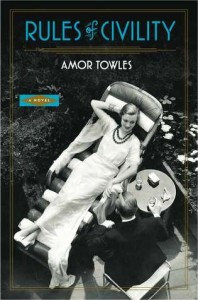 978-0670022694 – Viking – Hardcover – $26.95 (ebook and audiobook versions also available)
978-0670022694 – Viking – Hardcover – $26.95 (ebook and audiobook versions also available)
Amor Towles’ Rules of Civility has become my favorite books. This WritersCast interview series has allowed me to read some incredibly good books this year; Amor Towles’ story of New York City in 1938 has risen to the top of my list of novels I fell in love with.
Rules of Civility opens with the book’s heroine, older, successful, married, with her husband viewing the famous mid-sixties Museum of Modern Art showing of Walker Evans’ 1938 New York City subway photographs. She and her husband see and talk about two particular photographs – a man she knew in 1938 and who mattered hugely to her life and helped shape the arc of her entire life. Then the real story begins, as flashback to that high intensity period of her life, when by accident, she began the process of becoming the person we meet at the opening of the book.
It’s a great way to start a book. Reminding us of just how much a role chance and happenstance – and what we make of it – means to our lives. Author Towles loves the way opportunity winds around us, especially it seems at the fraught time in our lives when we are setting out in the world to define ourselves, when we make the choices that define our lives, sometimes purely accidental, sometimes with just an inkling that these choices will have monumental effects.
There is a wonderful story here. Our heroine, Katey (who grew up as Katya, an immigrant’s daughter), is living in Manhattan. It’s 1938, still Depression era America, but just on the cusp of its ending. New York is both gritty and glitzy at the same time. Katey is working as a legal assistant, going out at night with her limited funds and her few friends.
One night, she and her best friend meet a man who will thrust Katey into a new life, where she meets the smart set of society, and gains the confidence to become a modern, successful woman, in many ways mirroring the American story arc of the same period.
Towles is a terrific writer, and I found myself reading some passages aloud to revel in the beauty of his sentences. He brings New York in 1938 to life, reminding us how close we actually are to what is now almost a forgotten period of our history. The book made me want to see again some of the great movies of this era, all of which shared the ironic understanding of modern culture this book displays. I’m quite certain Towles has seen them all and internalized their values.
You need to read this story for yourself – it’s complicated and has an utterly rewarding denouement. Suffice to say, Katey learns a great deal about the people she meets, loves some, despises others, and absorbs what she learns on the way to becoming herself. This one year is the pivot point for her entire life, and the sense we get from the story is that New York has engendered the same for millions who came there for a very long time, though probably for many less self-aware than Katey and her author, Amor Towles. Here’s one of the great lines from the book that in some ways encapsulates the story it tells: “from this vantage point Manhattan was simply so improbable, so wonderful, so obviously full of promise — that you wanted to approach it for the rest of your life without ever quite arriving.” Perfect.
This is Amor Towles’ first published novel. In our discussion, we talked about how he was able to write it, despite having a full time job and a family. And we talked about the story of the novel, and its characters, and about New York in the 1930s, a great and somewhat neglected period for fiction. It’s a great book and I hope an equally rewarding conversation for listeners.
Amor Towles website is worth a visit. And you also might enjoy George Washington’s Rules of Civility (& Decent Behaviour In Company and Conversation) which plays a critical role in this novel. And a nonfiction piece he wrote called What I learned from Cole Porter on Oprah.com.
And a nonfiction piece he wrote called What I learned from Cole Porter on Oprah.com.
Podcast: Play in new window | Download
M.J. Rose: The Hypnotist
September 21, 2011 by David
Filed under Fiction, WritersCast
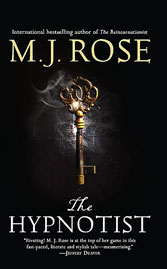 978-0778329206 – Mira Books – paperback – $14.95 (e-book and audio book editions available)
978-0778329206 – Mira Books – paperback – $14.95 (e-book and audio book editions available)
M.J. Rose is a critically acclaimed novelist – she’s best known for her thrillers, of which The Hypnotist is one. It’s in a series with The Reincarnationist and The Memorist, all them with reincarnation as a central theme. MJ’s characters are compelling and well drawn, and her stories are complex and original, the books are fun to read and impossible to put down. What more could you ask of a novel?
M.J. is also well known among writers for her activism in behalf of writers, and her brilliant understanding of marketing. But that’s a different conversation than the one we had about The Hypnotist, a book I deeply enjoyed reading, for me perfect as I got to read the book on vacation, and it is way better than most books we think of as “beach reads.” As one reviewer said: The Hypnotist has “something for everyone: murder, suspense, history, romance, the supernatural, mystery and erotica.”
The detective Lucian Glass becomes deeply involved in the pursuit of anti-hero Malachai Samuels, whose Phoenix Foundation is committed to the study of reincarnation (at almost any cost). Glass is a tortured soul whose own life connects him to the present and past day lives of other characters in this novel. It’s a complexly drawn story and one that will reward readers, even those who have no interest in the paranormal or esoteric metaphysical subjects that are do beautifully woven through the story. You will enjoy the denouement, and the story will stay with you long after you have turned the last page of the book.
Rose is a skillful writer who treats her readers to a high level of originality and surprising story making. She is also fun and rewarding to talk to about her books, as she shows in this insightful interview. She has a great website, a couple of blogs, and aside from having written 11 works of fiction, she has also co-authored two books about writing, and has been profiled in Time Magazine, Forbes, The New York Times, Business 2.0, Working Woman, Newsweek and New York Magazine, and has been on many television shows. She is also the founder of the very successful book promotion business, AuthorBuzz.
Podcast: Play in new window | Download
Dean Bakopoulos: My American Unhappiness
September 5, 2011 by David
Filed under Fiction, WritersCast
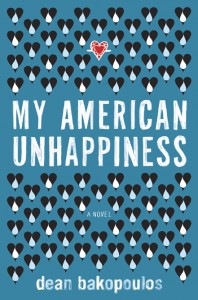 978-0151013449 – Houghton Mifflin Harcourt – Hardcover – $24.00 – ebook editions available
978-0151013449 – Houghton Mifflin Harcourt – Hardcover – $24.00 – ebook editions available
Dean Bakopoulos is a very funny and perceptive writer. My American Unhappiness, his second novel, takes place in Madison, Wisconsin during the period of the second Bush administration. Both the geographical and political backdrops are crucial elements of the story, whose main character is Zeke Pappas, a nebbish who runs a nonprofit called the Great Midwestern Humanities Initiative.
Zeke is an obsessive of some great measure. His life work has become the creation and maintenance of an “inventory of American Unhappiness,” a project that is a “byproduct of an overly cerebral loneliness.” He is also wildly naive and unrealistic, characteristics which in a certain way serve him well, as he is surrounded with problems in his life that would defeat the average person in short order.
Bakopoulos brilliantly balances the personal difficulties faced by Zeke with his involvement with some of the darker elements of the Bush era, including corrupt conservative politicians hiding the kind of personal behavior they legislate against in public, and the disconcerting pursuit of Zeke by a dark security-oriented governmental agency established after 9/11.
In some ways, the book could be read as just a zany midwestern comedy, but it’s clear that with Zeke Pappas’s story, Bakopoulos wants to tell us something important about 21st century American society. Zeke’s world is falling apart. His mother develops cancer, and decides to give her orphaned grandchildren (whom Zeke loves) to an aunt, unless Zeke can marry in time (impossible for him as he is simply too unrealistic about women). The government wants to audit the nonprofit he runs. Nothing works for Zeke. It’s a situation he feels he shares with the country as a whole, and Zeke knows it is the President that is the source of American unhappiness and ennui. Zeke sees Bush as “unencumbered by something as pervasive as unhappiness,” which makes him unfit to lead a country as complex and haunted as America. For Zeke Bush does not have the depth of spirit required to lead the nation.
Dean Bakopoulos is a writer to watch, a writer with great skills and who does have the depth of spirit required to portray the American scene through fiction. He is also a terrific writer to talk to about his work and gave me a great interview. You can visit his website to learn more about his work and ideas. I am definitely looking forward to reading his next book.
I am definitely looking forward to reading his next book.
Podcast: Play in new window | Download
Scott Gummer: Parents Behaving Badly
July 31, 2011 by David
Filed under Fiction, WritersCast
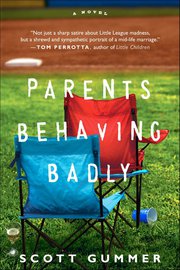 978-1451609172 – Simon & Schuster Touchstone – hardcover – $23.00 (ebook versions available)
978-1451609172 – Simon & Schuster Touchstone – hardcover – $23.00 (ebook versions available)
Scott Gummer’s Parents Behaving Badly appealed to me right away – a novel about Little League, what more fun could you want? Baseball is one of my greatest passions and having been a Little League parent and coach, I was looking forward to reading a novel set in this rich environment that so full of potential for conflict and frustration, as well as great joy.
In any kid sports environment, you have parents’ overwrought desires and expectations, the fraught interactions of coaches and parents, and the difference in outlook between any given 10 year old and any parent is especially fertile ground. And don’t forget the potential for unexpected romance among the suburban parental set.
Reading Parents Behaving Badly, which is, by the way, laugh out loud funny, did not disappoint in any way. Gummer is funny and extremely perceptive, and what really makes the novel work is that he tells a good story, writes believable characters, explores their inner lives, and keeps us guessing about what will happen next.
And there’s more here than Little League, fun and sometimes as painful as that particular piece of Americana can be. His main character is back in the hometown he grew up in, along with his wife, and they’ve been married long enough for them to know each other all too well. Gummer is very sharp in his depiction of the mid-life married life of modern American suburban couples, especially the challenges they face as their lives become focused on their children at the risk of losing sight of themselves and their relationships. He uses Little League, small town life, pop culture and thwarted desires as fodder for a wonderful story that ultimately ends better than one might have imagined.
Tom Perrotta gave a great blurb to author Gummer for this book: “Parents Behaving Badly isn’t just a sharp satire about Little League madness; it’s also a shrewd and sympathetic portrait of a mid-life marriage. Scott Gummer writes with equal insight about wayward spouses and conniving coaches.” Perrotta is among my favorites of contemporary novelists, and I’m happy to say that if you like his work, you will love Parents Behaving Badly, which while in no way derivative, is certainly in the same vein as Perrotta’s novels.
Scott gives a great interview, doubtless because of his years of experience as a working journalist. He knows how to talk about his work and to present his story vividly without giving too much away. I recommend his website as well. He’s also written a couple of very interesting nonfiction books about golf (this is his first published novel).
Podcast: Play in new window | Download
Nick Mamatas: Sensation
July 21, 2011 by David
Filed under Fiction, WritersCast
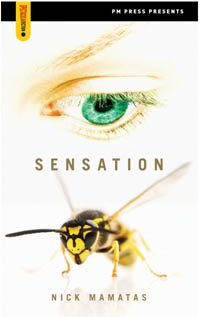 978-1604863543 – PM Press – paperback – $14.95 (e-book editions available)
978-1604863543 – PM Press – paperback – $14.95 (e-book editions available)
“When Julia Hernandez leaves her husband, shoots a real estate developer, and then vanishes without a trace, she slips out of the world she knew and into the Simulacrum—a place where human history is both guided and thwarted by the conflict between a species of anarchist wasps and a collective of hyperintelligent spiders. When Julia’s ex-husband Raymond spots her in a grocery store he doesn’t usually patronize, he’s soon drawn into an underworld of radical political gestures where Julia is the new media sensation of both this world and the Simulacrum.”
Nick Mamatas is an incredibly inventive writer. Sensation combines comedy, inter-species communication, fantastic imagination, social and political critique into a fast moving, tightly plotted and very unusual storyline. By combining a science fiction bent with a hyper-real portrayal of modern digitally connected culture, Mamatas is able to play with all the elements of modern everyday life, so we see things differently, perhaps even more clearly.
In some ways like The Matrix, there is an invisible world around and behind our own. Fittingly, in Sensation, that world is essentially woven by a species of spiders that has created an very special relationship with the human world, one that is far from predictable and complicated in its own right. These spiders care about humans, protect them, and use them for their own purposes in an ongoing war with a parasitic species of wasps. On this unlikely and unusual premise, Mamatas has built a fantastic story.
I enjoyed reading this book on a number of levels, not the least of which for the author’s simultaneously dark, comedic and critical approach to our modern digital, paranoid, corporatized and controlled society. I do like it when a novelist can successfully include political critique in a work of fiction. Mamatas is an accomplished writer with a dystopian outlook I enjoy. And similarly I enjoyed our conversation about this book and the author’s approach to writing. I think you will appreciate his approach to talking about his work.
“Nick Mamatas continues his reign as the sharpest, funniest, most insightful and political purveyor of post-pulp pleasures going. He is the People’s Commissar of Awesome.” — China Mieville, award-winning author of Kraken and The City and the City
Nick’s website is well worth a visit as well as his online journal (Nihilistic Kid).
Podcast: Play in new window | Download
Caroline Leavitt: Pictures of You
June 22, 2011 by David
Filed under Fiction, WritersCast
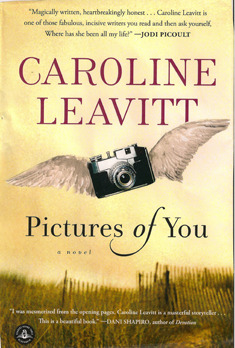 978-1565126312 – Algonquin Books – $13.95 – paperback original (ebook versions also available)
978-1565126312 – Algonquin Books – $13.95 – paperback original (ebook versions also available)
I’ve become a big fan of Caroline Leavitt’s work – I read Girls in Trouble last year and interviewed this very entertaining and engaging author about that book for WritersCast in 2010 (listen to that interview here).
Pictures of You starts with a car crash, and some of the unanswered questions about how and why it happened, inexorably and permanently linking the lives of two families. These complicated relationships are at the core of the novel. There are many threads to unravel in this story, and it was for me a completely compelling book to read. The two women involved in the crash, Isabelle and April, were both fleeing their lives at the time; the crash stops time for both of them, one literally, the other figuratively and psychologically.
Isabelle is the woman who survives the crash; her connection to the other woman, April, who does not, and April’s family (who lived only six blocks away from her when the crash occured), is what drives the novel forward. There’s a great deal of pain and suffering in this novel, but it is never overwhelming, we are drawn to these characters and recognize the choices they make, and sympathize with their difficulties throughout, the imperfections of human beings we fully recognize in our own lives.
This is a complex story about the nature of family, how we depend on others and how they let us down in small and large ways, and how people are able to recreate their lives, sometimes painfully, when those lives have been broken. Carolyn See wrote a wonderful review of the novel for the Washington Post that ends with this wonderful description: “This is a novel that invites us to look at our own imperfections, not the dramatic crimes, but the niggling little sins of omission that so often render our lives tragically undernourished and small.”
If you have not discovered the work of Caroline Leavitt (she’s a busy writer, the author of ten novels, writes criticism for the Boston Globe and People, teaches novel writing for UCLA online, and judges fiction awards too), Pictures of You would be a great book to start with. It’s complex and rewarding, and deeply humane.
Caroline blogs at CarolineLeavittville.com and has a fun website as well (Welcome to Leavitt Town…)
Podcast: Play in new window | Download
Peter Mountford: A Young Man’s Guide to Late Capitalism
May 10, 2011 by David
Filed under Fiction, WritersCast
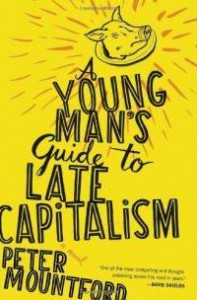 978-0-547-47335-2 – Houghton Mifflin Harcourt – paperback – $15.95 (ebook versions available)
978-0-547-47335-2 – Houghton Mifflin Harcourt – paperback – $15.95 (ebook versions available)
I read about this book a few months ago and knew from the title alone that I wanted to read this novel. How many political novels are there (readable ones anyway)? Well, it turns out that Peter Mountford is a terrific writer, and A Young Man’s Guide to Late Capitalism is a very special debut novel, completely captivating and very subtle, even as it takes on some of the characteristics of a French farce (with the requisite literal and figurative doors opening and closing throughout).
The book is about Gabriel, a young former reporter, not that long out of Brown, now operating as a covert hedge fund analyst in Bolivia, which is on the verge of electing a new populist president. Gabriel’s new job pays him incredibly well and puts him in the position of lying to absolutely everyone in his life, from his mother, a famous Chilean exile writer/professor (and a political radical), to all the journalists he cultivates, the older woman reporter he sleeps with, the young and beautiful press attache of the president to be (with whom he falls in love), to Evo (the presidential candidate himself) and everyone else in between.
One of the strengths of this novel is that there are so many well crafted characters in this novel who actually matter to the story – though I admit there were times while I was reading that I had trouble keeping them all straight. Another strength of the novel is Mountford’s portrait of Bolivia itself. He weaves it beautifully into Gabriel’s story, and gives the country a wonderful character and strength.
This story is of course all about power and money in modern high level capitalism, and what they do to the hearts and souls of the individuals caught in its web. But Mountford resists making it easy for his characters or for us. Choices are not simple, causes and effects are complex, and yes, morality is often the primary casualty. But we do end up feeling deeply for Gabriel and understanding his choices, even if we find them difficult to accept. In that way, Peter Mountford has created a truly sympathetic character in a real life story, it’s one we recognize, understand, and must wonder how much of ourselves we see in it.
I really enjoyed having the opportunity to discover and read this book and talk to Peter Mountford while he was in the midst of his book launch tour. He’s an energetic talker about his work, which made our conversation great fun. I think you will enjoy our talk, and hopefully the book as well. I’m looking forward to his next book too – this is a writer we will want to hear more from. He’s a real find for anyone who likes to read new voices in modern fiction.
He’s a real find for anyone who likes to read new voices in modern fiction.
Podcast: Play in new window | Download

